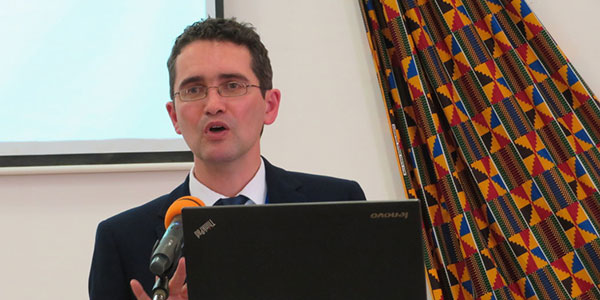Southern Africa heading towards climate tipping points
- Wits University
Professor Francois Engelbrecht from the Wits GCI stresses climate risks for southern Africa in talk on Africa’s projected climate change futures in Accra, Ghana
Professor Francois Engelbrecht of the Wits Global Change Institute (GCI) and a Lead Author of the IPCC’s Special Report on Global Warming of 1.5°C (SR1.5) presented on the physical basis of climate change on a recent outreach event of the IPCC (Intergovernmental Panel on Climate Change) in Accra, Ghana.

This outreach event was organised by the IPCC, the United Nations University Institute for Natural Resources in Africa (UNU-INRA), the African Academy of Science (AAS) and the University of Ghana (UG). It was the first of series of sub-regional outreach events in Africa and focused on the key messages from the IPCC SR1.5.
Engelbrecht stressed in his presentations the increasing risk of climate change induced regional tipping points in the African water-energy food nexus. He pointed out that the IPCC SR1.5 identified southern Africa as a climate change hot-spot, due to the region being likely to become generally drier, whilst at the same time warming at about twice the global rate of temperature increase.
The report pointed out that 3°C of global warming (which translates to about 6°C of regional warming in the southern African subtropics) may be a tipping point in terms of the sustainability of the cattle industry and maize crop in southern Africa. He also emphasised the increased likelihood for multi-year droughts occurring in southern Africa even under 1.5°C of global warming, a threshold the IPCC SR1.5 states may be exceeded as soon as 2030.
This, Engelbrecht mentioned, translates to an increased likelihood of “day zero” events occurring not only in Cape Town in South Africa, but potentially also in Gauteng. Moreover, he explained that the SR1.5 report has pointed out the potential increase of the number of intense tropical cyclones under global warming, and mentioned that the devastating flood event caused by tropical cyclone Idai in March this year may well prove to be yet another fingerprint of climate change in the southern African region.
Engelbrecht said enhanced regional sharing and trade in food, energy and water may become an increasingly important adaptation tool in Africa, towards enhancing resilience to high-impact climate events. He also pointed out the importance of strengthening African climate science, through extended weather observation networks and numerical climate modelling capabilities.
“Climate science itself should increasingly be used as an adaptation tool towards anticipating regional tipping points in the African climate system,” said Engelbrecht.
Engelbrecht currently serves as a Lead Author in Assessment Report Six of the IPCC, which is to be published in early 2021. The role and activities of the IPCC, its work programme and its relevance to policy and decision making in Africa was also discussed extensively at the regional outreach event. Information was also provided about other IPCC reports from the AR6 Cycle in the context of the implementation of the Paris Agreement and the 2030 Sustainable Development Agenda.
The IPCC regional events will raise awareness about the process of development of the IPCC assessments and will explore the opportunities for the African scientific community to be involved and to contribute to the work of the IPCC. Through interactive workshop sessions, an effort will be made to boost two-way information flow and increase the African participation in the IPCC process and products.
More information on the IPCC regional event is available at:

